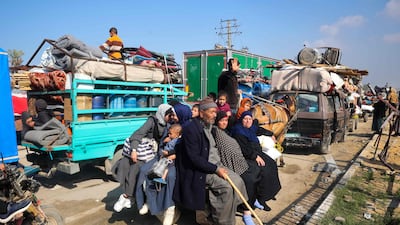Live updates: Follow the latest on Israel-Gaza
Gazans returning north after a ceasefire agreement between Hamas and Israel are facing further displacement after months away from their homes, many of which have been destroyed by Israeli bombardment.
Gaza city's landmarks, including Ibn Uthman Mosque, Gaza's second biggest and the corniche have been destroyed. UN heritage body Unesco said in December that Israeli fire had destroyed 75 cultural properties in the enclave, including 10 religious sites, six monuments, a museum and seven archaeological sites.
As well as the cultural heritage, those returning north face returning to destroyed homes - the UN estimates that nine in ten have in destroyed. But some took solace in familiar, if irrevocably changed, surroundings.
“It’s a strange but comforting feeling to be surrounded by your family, your home, your neighbours, and all the people you love, even amid the devastation,” Muayyad Al Najjar, 37, told The National. His home in Al Saftawi, a three-story building with six apartments, had been reduced to rubble, leaving his family of five to sleep in tents outside on their return from the south.
“The destruction was shocking, but we were honestly relieved and happy. We started preparing to clean up and set up tents for everyone around the site.”
“I felt like I was in paradise when I arrived in Gaza [city], smelt its soil, and breathed in the scent of its sea. There’s no place in the world like Gaza,” Mr Al Najjar said.
Despite having no home or possessions left, he stands by his decision to return. “For us, the streets of Gaza are more comforting and beautiful than any street in the world, despite the massive destruction and the hardship of displacement and homelessness we endured.”
On their first night back, Mr Al Najjar and his family slept in a tent his cousins set up near the ruins of their home. “The destruction was shocking, but we were honestly relieved and happy. We started preparing to clean up and set up tents for everyone around the site.”
On Monday, Gaza's authorities said more than 300,000 people had crossed into Gaza city and the north edge of the enclave from areas in the south.
Tents like Mr Al Najjar's were erected across the city and the surrounding areas as the thousands found their homes destroyed.
Saad Al Namleh, 45, a resident of Jabalia camp, was displaced to Khan Younis during the conflict, fleeing the north in fear for his children's safety. However, he travelled back as soon as he heard he could return to his old neighbourhood.
“I knew my home in Jabalia camp was gone, and there was no alternative place for us to stay. We spent our first night literally on the street, with nowhere to go. We never imagined the situation would be like this, with such widespread destruction,” Mr Al Namleh said.
He fled northern Gaza with his eight family members in November 2023, walking through the Netzarim checkpoint, which separates the enclave's north and south. Along the way, they endured searches by Israeli soldiers.
“My young children were with me, and it was an incredibly difficult situation for them,” he said.
Life in the south was challenging from the beginning. Initially, Mr Al Namleh and his family lived in a tent in Rafah. The ground invasion of Rafah by Israeli troops forced them to relocate to Al Mawasi in Khan Younis, where they continued to live in tents under harsh conditions.
“The details of life in displacement were excruciating – problems with water, food, hunger, and sanitation. Every single aspect of daily life became a burden,” he said. Summers brought plagues of mosquitoes and rodents while freezing temperatures were recorded in the winter.
“No one paid attention to our suffering. No one provided aid or addressed our needs. We were utterly abandoned,” he said.
The only solace, he said, was the occasional contact with family members who had remained in the north.
“Maintaining communication was nearly impossible. We had no way to charge our phones, and the Israeli military frequently cut off communication networks. We lived in constant fear and anxiety for their safety,” he said.
When Mr Al Namleh returned to the Jabalia camp, he was confronted with total devastation.
“The camp was obliterated – there wasn’t a single stone left standing. There wasn’t even enough space to pitch a tent. Sadly, we saw no clear efforts to provide accommodations for returning families.”
Gazans returning north told The National they are determined to rebuild, no matter the challenges, rebuking comments by US President Donald Trump that the population of Gaza should be housed elsewhere.
Even those who found their homes intact have much work to do, like Sujood Hassanein, a resident of Al Shuja’iyya displaced to Deir Al Balah.
“We’ll work on repairing it and move back in because we have no other choice. There’s no place more comforting or dear to us than our home,” she said.

One of the most striking images for Ms Hassanein was the destruction of Gaza’s corniche, a place that once symbolised life, joy and hope.
“Now, it’s nothing but rubble. The Israeli army deliberately targeted every aspect of life in Gaza, killing its spirit. We’ve returned to it as a wasteland, uninhabitable and broken,” she said.
Ms Hassanein expressed a mix of emotions: grief for the immense loss and the displacement her family endured but also relief and gratitude for returning to Gaza. “It’s overwhelming sadness for what has happened and joy that, by the grace of God, we’ve returned to Gaza and seen our land again after all this time apart.
“We love Gaza and will never abandon it. Leaving it in the first place was the mistake of our lives. No matter what happens from now on, we won’t leave again because displacement is tormenting and being away from home is a humiliation like no other.”


